MercoPress. South Atlantic News Agency
Tag: ECB
-
Wednesday, July 13th 2011 - 18:49 UTC
Europeans countries borrowing on Germany’s credit rating is over, says Dragui
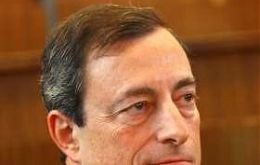
Europe’s debt crisis has entered a new phase and policy makers must come up with a “clear” response to stop the contagion that threatens the region’s single currency, said the European Central Bank’s incoming President Mario Draghi.
-
Thursday, July 7th 2011 - 18:24 UTC
Former banker praises Uruguay’s handling of “Argentine debacle” in 2001/2002

European policymakers grappling with problems in Greece, Portugal, Ireland and Spain should follow the path set by the Uruguayan government a decade ago, dealmaker William Rhodes told CNBC on Thursday.
-
Thursday, July 7th 2011 - 16:20 UTC
Euro-zone decides to contain inflation and hikes interest rates to 1.5%
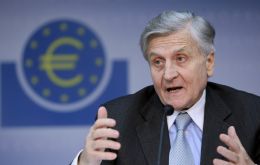
The European Central Bank (ECB) decided on Thursday to raise interest rates to 1.5% from 1.25% in an attempt to cool inflation in the 17-nation Euro zone. ECB president Jean-Claude Trichet said that inflation, now 2.7%, was likely to remain “clearly” above the ECB 2% target over the coming months.
-
Thursday, July 7th 2011 - 16:15 UTC
Europe accuses credit rating agencies of having an “oligopolistic” structure

The 'oligopolistic structure' of international credit rating agencies is probably undesirable, the head of the European Central Bank Jean-Claude Trichet said on Thursday.
-
Monday, May 9th 2011 - 16:54 UTC
Global central bankers concerned with commodity markets’ volatility
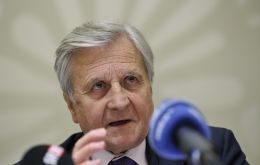
Global central bankers voiced concern about recent volatility in commodity markets, saying they needed to better understand its impact on inflation at a time when some emerging economies may be overheating.
-
Monday, April 25th 2011 - 07:09 UTC
An Italian, ‘Super Mario’, the leading candidate to replace Trichet at ECB

France considers Bank of Italy Governor Mario Draghi the leading candidate to succeed Jean-Claude Trichet at the helm of the European Central Bank. However the key decision maker, German Chancellor Angela Merkel, has yet to tip her hand. Merkel’s aides have indicated that Germany, Europe’s biggest economy, no longer insists on a German to succeed Trichet.
-
Thursday, March 3rd 2011 - 19:14 UTC
Prepare for a “possible” interest rise in Euro zone warns ECB President Trichet
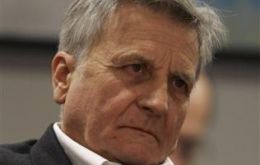
The president of the European Central Bank has said that a rise in Euro zone interest rates was “possible” at its next policy meeting in April. Jean-Claude Trichet said the ECB was “in a posture of strong vigilance” against rising inflation.
-
Thursday, February 3rd 2011 - 21:17 UTC
With inflation pressures ‘contained’, ECB leaves interest rates unchanged

European Central Bank (ECB) has kept interest rates in the Euro zone unchanged at a record low 1%, despite fears of increasing inflation. Speaking at a press conference after the rate decision, the ECB president Jean-Claude Trichet claimed that inflation pressures remained contained.
-
Thursday, November 4th 2010 - 20:04 UTC
Trichet does not believe the US is actively weakening the dollar by printing money
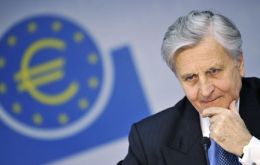
European Central Bank President Jean-Claude Trichet said on Thursday he did not think the United States was actively trying to weaken the dollar by printing money, despite criticism from emerging economic powerhouses.
-
Wednesday, October 6th 2010 - 00:13 UTC
Fed and ECB “flood of liquidity” plunging the world into “chaos” warns Stiglitz
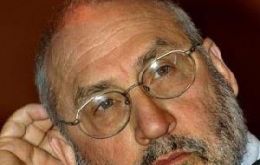
The policies of extremely low interest rates maintained by the Federal Reserve and the European Central Bank are plunging the world into chaos instead of helping with the recovery of the global economy, the winner of the Nobel Prize in economics, Joseph Stiglitz, said on Tuesday.
